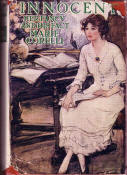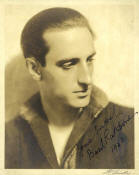Innocent
|
| Basil Rathbone made his motion picture debut in the 1921 drama
Innocent. Starring Madge Stuart and Basil Rathbone,
the film was based on the novel Innocent: Her Fancy and His Fact
written by Marie Corelli
in 1914. In his biography of Basil Rathbone, Michael Druxman wrote, "Critics felt the story was somewhat artificial, although they had nothing but praise for the picture's beautiful rustic exteriors and remarkable camera work, as well as the dramatic performances. Innocence (Madge Stuart) is an orphan, who leaves her country home after the death of her foster-father. Traveling to the city, she makes a living as a novelist and, subsequently, has an affair with painter Amadis de Jocelyn (Rathbone). The artist ultimately discards Innocence and she returns to the farm. Enroute, she is caught in a storm and dies. Rathbone garnered favorable notices for his portrayal of the selfish lover."1 |
I have not seen the film, so the following summary is based on the novel.2 The story centers around a young woman named Innocent, who had grown up on Briar Farm, in the English countryside. (In the 1921 film, her name was changed to "Innocence.") Innocent had believed herself to be the daughter of Hugo de Jocelyn, owner of Briar Farm. He was a descendent of a French knight, Amadis de Jocelyn, who had settled in England and founded Briar Farm. Innocent grew up reading ancient manuscripts of poetry written by the Amadis. She loved the poetry and idolized the old knight.
Now that Innocent had grown up, Hugo told her the truth about her birth. One stormy night, a man had come to the farm and asked Jocelyn to take care of his baby girl for a few days. He said he'd come back for her, but he never did. So, farmer Jocelyn raised the girl as his own. This revelation was devastating to Innocent. She had been so proud to be descended from the French knight Amadis de Jocelyn—and now she felt she was a nobody. “She no longer had any link with the far-away ancestor who had served her so long as a sort of ideal—she was a mere foundling without any name save the unbaptized appellation of Innocent. And she regarded herself as a sort of castaway” (p. 120).
A short time later, Hugo de Jocelyn died. While Innocent was grieving, she received a visit from Lady Maude Blythe and learned that Lady Maude was her mother and that her father was an artist named Pierce Armitage, now deceased. Lady Maude offered to adopt Innocent, so she could give her a good life in which she would want for nothing and she could be introduced to the right people in society. Surprisingly, Innocent turned down this offer. She was insulted that Lady Maude would not publicly acknowledge Innocent as her own daughter. Adoption was not an acceptable option for Innocent; it would still be deception. Also, Innocent didn't feel she needed someone to take care of her. She was determined to work and make a living herself. Lady Maude left, warning Innocent that she would regret her choice.
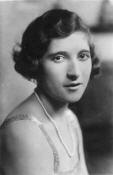 Madge Stuart, who played "Innocence" |
Briar Farm may have looked like this. |
Innocent left the farm and went to London. She didn't feel entitled to use the surname Jocelyn, so she adopted the name Armitage, the name of her birth father. She found lodging with a kind middle-aged lady named Lavinia Leigh, who, coincidentally, had been in love with Pierce Armitage and actually had a portrait of him hanging in the house. But Innocent claimed to be no relation to the man.
Reading Amadis de Jocelyn's poetry had inspired Innocent to become a writer herself. After a year her first novel was published and it was a huge success. Everyone wanted to meet the young author of this great literary work.
Attending a party one evening, Innocent noticed a handsome man (played by Rathbone), "who gazed at her observantly and critically with a frank openness which, though bold, was scarcely rude. She caught the straight light of his keen blue eyes—and a thrill ran through her whole being. She asked her host who the man was, and he told her that the man's name was Amadis de Jocelyn—the same name as her old Stone Knight of France! . . . The host introduced her to Mr. de Jocelyn. . . . and her heart beat so quickly that she could scarcely speak in answer when he addressed her" (p. 257).
Innocent told him about the other Amadis de Jocelyn, the noble knight of France. "She looked up with a serious, sweet luminance in her eyes—and he was suddenly thrilled by her glance, and moved by a desire to turn her romantic idyll into something of reality. This feeling was merely the physical one of an amorously minded man,—he knew, or thought he knew, women well enough to hold them at no higher estimate than that of sex-attraction,—yet, with all the cynicism he had attained through long experience of the world and its ways, he recognized a charm in this fair little creature that was strange and new and singularly fascinating" (p. 261).
Jocelyn explained his family history. He was descended from Jeffroy, brother of Amadis, the knight she knew so well. His family thought that Amadis had died in battle. They knew nothing about Briar Farm or the descendents of Amadis. This modern Amadis was a painter, and somewhat famous. He was selfish, cynical and egotistical, but Innocent didn't see that in him. She believed that he was noble and honorable, like his ancestor's brother. To her, Amadis de Jocelyn was the wonderful realization of an ideal.
| INNOCENT This is the title of a fine Stoll photoplay adapted from Marie Corelli's popular novel of the same name. The happy combination of this famous authoress's name and a picture of exceeding merit should fill every cinema where it is shown. "Innocent" is a symbolic production rather than a concrete production of actuality, says Mr. Maurice Elvey. This description is confirmed and amplified by several notable critics who agree that the beauty of the English countryside at harvest time is revealed in a way that [is] ... wholly reminiscent of Rembrandt. This is a film in which the eye of the artist blends perfectly with the highest photographic skill—so much so that the simple story is lifted to the dignity of a "poem in pictures." The caste is one of exceptional ability, and includes Madge Stuart as "Innocence," Ruth Mackay as Lady Maude, and Basil Rathbone as Amadis de Jocelyn. This magnificent subject provides the principal attraction for the beginning of next week. —The Todmorden Advertiser, July 1, 1921 |
Months passed; Innocent's second book was published and her fame grew. She saw Amadis again at a reception and dance at the home of the Duchess of Deanshire. When the Duchess saw the way that Amadis looked at Innocent, she asked him, "Are you going to make love to her? You make love to every woman—but most women understand your sort of love-making" (p. 296). She warned him that Innocent would take it seriously. Ignoring the Duchess's warning, Amadis danced with Innocent, and then took her out into the garden for some wooing. They sat together on a bench. "She was barely conscious of herself, or of anything, save that 'Amadis de Jocelyn' was beside her. She had lived so long in her dream of the old French knight, whose written thoughts and confessions had influenced her imagination and swayed her mind since childhood, that she could not detach herself from the idealistic conception she had formed of his character,—and to her the sixteenth-century 'Amadis' had become embodied in his modern man of brilliant but erratic genius" (p. 301).
Innocent's thoughts were interrupted by a passionate kiss. "Silently she clung to him, yielding more and more to the sensation of exquisite joy that poured through her whole being like sunlight." She was experiencing love for the first time. "Love was hers, she thought—at last!—she knew the great secret, the long delight that death itself could not destroy,—her ideal of romance was realised, and Amadis de Jocelyn, the brave, the true, the chivalrous, the strong, was her very own!" (p. 302)
Unfortunately, this Amadis was not a chivalrous knight, and he wasn't in love with her. "What he felt for her was what all men feel for each woman who in turn attracts their wandering fancies—the desire of conquest and possession. . . .
"Love such as she imagined love to be, was not in his nature—he conceived of it merely as a powerful physical attraction which exerted its influence between two persons of opposite sexes and lasted for a certain time—then waned and wore off—and he recognised marriage as a legal device to safeguard a woman when the inevitable indifference and coldness of her mate set in, making him no longer a lover, but a household companion of habit and circumstance, lawfully bound to pay for the education of children and the necessary expenses of living" (p. 303).
Innocent was headed down a road towards heartbreak. But for several weeks she was head-over-heels in love, and on top of the world with euphoria.
"Since that ever memorable night when he had suddenly stormed the fortress of her soul, and my the mastery of a lover's kiss had taken full possession, Amadis de Jocelyn had pursued his 'amour' with admirable tact, cleverness and secrecy. He found a new and stimulating charm in making love to a tender-hearted, credulous little creature . . . to a man of his particular type and temperament there was an irresistible provocation to his vanity in the possibility of being able to lure her gradually and insidiously down from the high ground of intellectual ambition and power to the low level of that pitiful sex-submission which is responsible for so much more misery than happiness in this world" (p. 350).
Amadis became the center of Innocent's world. He was painting a portrait of her, so she visited his studio every day to sit for it. "She wished to be beautiful, brilliant, renowned and admired, simply that he might take joy in knowing that this beautiful, brilliant, renowned and admired creature was his, body and soul—existing solely for him and content to live only so long as he lived, to work only so long as he worked,—to be nothing apart from his love” (p. 358).
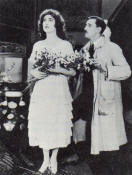 Madge Stuart and Basil Rathbone |
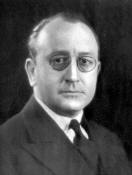 Director Maurice Elvey |
Innocent had so deluded herself that she believed Amadis would marry her. She dreamed of buying Briar Farm, so that she and Amadis could raise a family there.
“And so the time drifted on—and with its drifting her work drifted too, and only one all-absorbing passion possessed her life with its close and consuming fire. Amadis de Jocelyn was an expert in the seduction of a soul—little by little he taught her to judge all men as worthless save himself, and all opinions unwarrantable and ill-founded unless he confirmed them”
(p. 360).Amadis de Jocelyn loved Innocent in a purely physical way only. He could not be the man that she needed. “From a mental or intellectual standpoint all women to him were alike, made to be ‘managed’ alike, used alike, and alike set aside when their use was done with” (p. 362).
Eventually, Amadis felt it was time to end the affair. He knew this would crush Innocent, but he figured that she would get over it and move on to love other men. He was wrong.
| "Now, child," he said—"listen to me
and be good and sensible! You know this cannot go on." . . . She trembled a little. Something cold and terrifying began to creep through her blood. . . . "You see, dear, we can't live on the heights of ecstasy forever" and he smiled,—a forced, ugly smile—"We've had a very happy time together, haven't we? . . . but the time has come for us to think of other things—other interests—your career,—my future—" She looked up at him in sudden alarm. . . . She turned deathly pale. . . . "Do you mean—that we are—to part? . . . Amadis! You don't mean it!—say you don't mean it!—You can't mean it, if you love me!" . . . The tragic beauty of her expression annoyed him. . . . He said, "I cannot marry you—I have never thought of such a thing!" . . . "Do you think—can you imagine that I am of so low and common a nature as to marry any man, after—after your kisses! . . . After your embraces which have held me away from everything save you!—After your caresses—oh God!—after all this,—do you think I would shame my body and perjure my soul by giving myself to another man?" . . . She flung herself at his feet. . . . "You are all my life!—I cannot live without you! Amadis!" . . . "I wish you'd get up from the floor and be reasonable!" . . . She slowly rose to her feet,—her sobbing ceased. "Then—you never loved me?" she said—"It was all a lie?" "I never lie," he answered, coldly—"I loved you—for the time being. You amused me." (pp. 396-403) |
When it finally dawned on Innocent that it was finally over with Amadis, she packed a bag and left London, bound for Briar Farm. She was caught in a violent storm and arrived at Briar Farm drenched and suffering from hypothermia. She died during the night.
When Amadis de Jocelyn learned of her passing, he felt no sense of remorse. "He was more relieved than pained,—more flattered than sorry! The girl had died for him,—well!—that was more or less a pleasing result of his power! She was a silly child—obsessed by a 'fancy'—it was not his fault if he could not live up to that 'fancy'" (p. 433).
"Innocent [is] a rather thin story which, however, the genius of the producer and the fine acting of Madge Stuart and Basil Rathbone have made into a beautiful film." —The Blyth News, March 24, 1921
"Basil Rathbone makes a romantic figure as the perfidious painter." —The Bioscope, February 17, 1921
Wikipedia has an entry about the book, which states that "the theme is the mistreatment of illegitimate children."3 I disagree. Although Innocent was illegitimate, she was not mistreated. Certainly people in the early twentieth century were less tolerant of children born out of wedlock than they are today, but in this novel, no one mistreated Innocent because of the circumstances of her birth. Amadis (the character played by Rathbone) dumped Innocent because he was a cad and that's what he did to all the women he became involved with. He never knew that Innocent was illegitimate. Most of the characters in the novel were not aware of Innocent's illegitimacy; the few who were aware of it were sympathetic with her situation. It is clear, however, that the author wanted to change the prevailing public opinion concerning illegitimate children. She wrote, "There's many a piece of wicked injustice in the world, but nothing more wicked than to set shame or blame on a child that's born without permit of law or blessing of priest. For it's not the child's fault—it's brought into the world without its own consent—and yet the world fastens a slur upon it!" (page 60) and "The man is never blamed! It's always the woman's fault!" (page 86)
It may not be possible to see the film, but it is possible to read the novel that was the basis for the film. It is available for free download in various formats (PDF, Kindle, EPUB) : http://www.gutenberg.org/ebooks/5165 and also https://archive.org/details/innocentherfanc00coregoog
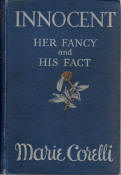 |
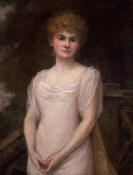 The author of Innocent: Mary Mackay (Marie Corelli), painting by Helen Donald-Smith, 1897 (National Portrait Gallery, London) |
"No expense has been spared to make the picture worthy of its great authoress." —The Yarmouth Independent, June 4, 1921
Innocent was released in March 1921 in the U.K. It is not currently available on DVD, Blu-Ray or videotape. It may not be lost, however. The following review from IMDb was written by someone in the U.K. who has seen the film. If the film has been preserved by the British Film Institute, it may someday be available on DVD.
| The 29-year-old Basil Rathbone made his screen debut in this silent film
that robbed him of his South African voice. His face is very animated, which
means that you can read his emotions and inner life quite easily. His youth
made him far more flexible in his range of emotions rather than the stiff he
ended up in his talking pictures of the 30s and 40s. He certainly learned
his trade in this film even if he didn't have presence. Without a doubt he
is a professional actor with enough experience to bring to the later
Sherlock Holmes films, but his projects do rely on dialogue which is why he
wasn't noted in this film. Without dialogue, Rathbone is just a rank and
file actor. User Review from IMDb |
Trivia: In 1918 a film with the same name, Innocent, was released in the USA. It was directed by George Fitzmaurice, whose wife, Ouida Bergere, wrote the scenario. One of the actors in the film was John Miltern, who later became a close friend and foster father to Basil Rathbone. Ouida, of course, became Rathbone's wife. The 1918 film was based on the four-act play Innocent, written by George Broadhurst, so the plot was different from the 1921 film Innocent.
|
NOTES
- Michael Druxman, Basil Rathbone: His Life and His Films (New York: A.S. Barnes and Co., 1975), 106.
- Quotes are from the following edition of the novel: Marie Corelli, Innocent: Her Fancy and His Fact (New York: George H. Doran, 1914). This edition can be downloaded for free at https://archive.org/details/innocentherfanc00coregoog
- Wikipedia entry on Innocent: Her Fancy and His Fact, http://en.wikipedia.org/wiki/Innocent:_Her_Fancy_and_His_Fact







